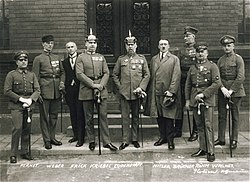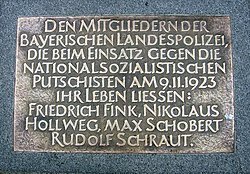Beer Hall Putsch
The Beer Hall Putsch was a failed coup d'état in Munich, Germany between the evening of 8 November and the morning of 9 November 1923.
During the Putsch, the Nazi Party under Adolf Hitler tried to take over the government of Bavaria, a state in Germany. They took several hundred people hostage in a beer hall (a large building where people got together to drink beer and sometimes listen to political speeches).
Several Nazis died when they got into a gun fight with police officers in another part of Munich. Hitler went to prison for eight months and wrote his manifesto Mein Kampf during that time.
Reasoning
Hitler chose to launch the Putsch for many reasons.
At the time, Germany was the Weimar Republic. The Republic and its government were weak because of fighting between right-wing and left-wing political parties. Because of inflation, many people did not have enough money to pay daily expenses. Sometimes, wages or pensions were not paid.
The Weimar Republic's financial problems started when Germany lost World War I. Other countries made Germany pay for the entire war, and Germany had to make taxes very high in order to pay. This hurt Germany's economy.
In the early 1920s, the Nazi Party was getting very strong. Hitler was a strong leader. In 1923, the year when the Weimar Republic was least popular, the Nazi Party grew from 6,000 members to 55,000.
With the Putsch, Hitler wanted to take control of the government by force. He wanted to copy Benito Mussolini, Italy's fascist dictator, who took power by invading Rome.
Attempted coup
On 8 November 1923, Hitler and his men entered the Beer Hall and took several hundred people hostage. The Sturmabteilung (SA) (the Nazi Party's paramilitary force) also took over the Army Headquarters, but they forgot to capture the telegraph office. This meant that anybody could call the police.
The Putsch failed. A day after it started, 16 Nazis and 4 Bavarian State Police officers were killed in a gunfight in Residenzstraße. Hitler was arrested two days later.
Results
After the Beer Hall Putsch, Hitler and some other participants were sent to prison for treason. Two other important Nazi Party officials, Hermann Goring and Rudolf Hess, were also imprisoned. They would later play key roles in the Holocaust.
Hitler spent about 8 months in prison, and the Nazi Party broke up after the Putsch (thought it would later get back together).
The Putsch made Hitler famous. Before the Putsch, he was unknown, but afterwards many people learned about him. He was a hero to many people after the Putsch. After the governments of the Weimar Republic, many German people wanted strong leadership, and some thought Hitler would provide that.
In prison Hitler wrote Mein Kampf (My Struggle), which became one of the most famous books in history. It sold millions of copies at the time and taught many people about Hitler's ideas. Rudolf Hess helped with the book; Hitler told Hess what he wanted to say and Hess wrote it down.
After the Putsch, Hitler rethought his strategy. He realised he could not take power using violence, the way Mussolini had in Italy. Instead, he had to get power through being elected.
Causalities
Sixteen participants in the Beer Hall Putsch died during the takeover. In Mein Kampf, Hitler calls them martyrs: the first people ever to die for the Nazi Party. They were:
- Andreas Bauriedl
- Anton Hechenberger
- Felix Alfarth
- Johann Rickmers
- Karl Kuhn
- Karl Laforce
- Klaus von Pape
- Kurt Neubauer
- Lorenz Ritter von Stransky
- Martin Faust
- Max Erwin von Scheubner-Richter
- Oskar Körner
- Theodor Casella
- Theodor von der Pfordten
- Wilhelm Wolf
- William Ehrlich
Beer Hall Putsch Media
Erich Ludendorff on the cover of Time, 19 November 1923
1 April 1924. Defendants in the Beer Hall Putsch trial. From left to right: Pernet, Weber, Frick, Kriebel, Ludendorff, Hitler, Bruckner, Röhm, and Wagner. Only two of the defendants (Hitler and Frick) were wearing civilian clothes. All those in uniform were carrying swords, indicating officer status.
Adolf Hitler reviewing SA members in 1935. He is accompanied by the Blutfahne ("blood flag") and its bearer SS-Sturmbannführer Jakob Grimminger.
One of the Munich Ehrentempels (Honour Temples), 1936
Related pages
- Adolf Hitler
- The Nazi Party
- Coup d'etat
- Sturmabteilung (SA)
- Weimar Republic










